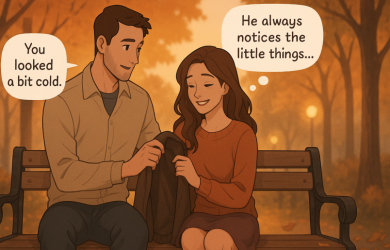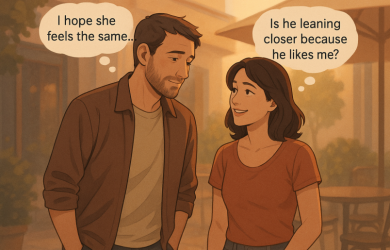29 Signs that Someone Doesn’t Care About Your Feelings

Unlock Daily 30-Sec Tips for a Happier Relationship
👉 Subscribe FREEKey Takeaways
Marriage.com AI Quick Summary
C.S. Lewis once said, “Affection is responsible for nine-tenths of whatever solid and durable happiness there is in our lives.” This thought highlights how meaningful our emotional connections are to our overall happiness.
Sometimes, however, it feels like these connections are one-sided, that our feelings are not being seen or returned. Realizing that someone might not care about our feelings as much as we care about theirs can be very upsetting.
From not sharing in your excitement to ignoring your worries, understanding signs of when someone doesn’t care about your feelings can help you see how healthy and balanced our relationships really are.
How can you tell if someone does not care for you and is emotionally detached from you?
When someone does not care for you and is emotionally detached, it often manifests as a noticeable absence of warmth and involvement in the relationship. You might feel a consistent coldness or disinterest from their side, which can be disheartening.
Studies show emotional interdependence, where partners
They may communicate less frequently, showing little interest in your day-to-day life or emotional well-being. Emotional detachment is not just about what they say; it’s equally about what they don’t say and do.
29 signs of when someone doesn’t care about your feelings
When you share a bond with someone, be it a friend, family member, or partner, you expect a level of care and understanding. However, there are times when it becomes evident that someone doesn’t care about your feelings.
Recognizing these signs can help you address the issue or reconsider the relationship’s value to your life. Here, we have outlined 29 indicators of emotional neglect and indifference in relationships, providing insight into the subtle and not-so-subtle ways people may show a lack of empathy or affection.
1. They don’t ask about your day
When someone doesn’t care about your feelings, they often show little interest in the details of your life.
If your partner or friend doesn’t ask about your day or how you’re feeling, it can be a sign of emotional neglect. This lack of curiosity can leave you feeling isolated and unimportant in the relationship.
2. They ignore your feelings
An uncaring partner might overlook or dismiss your emotions. If you find that your feelings are regularly ignored or minimized, this indicates a significant emotional disconnect. This behavior not only hurts but can also make you feel like your emotions are invalid.
3. They don’t celebrate your successes
A partner who doesn’t care will often show indifference to your achievements. Whether you get a promotion or reach a personal milestone, their reaction (or lack thereof) can feel like a cold shower in your warmest moments. This lack of support diminishes the joy of sharing your successes with them.
4. They never apologize
An inability or unwillingness to apologize is a clear sign of a lack of empathy. When someone doesn’t care about your feelings, they may refuse to acknowledge their mistakes, much less apologize for them. This can lead to a buildup of resentment and hurt in the relationship.
5. They are always focused on themselves
If your conversations are predominantly about them and their issues, it could signal apathy in the relationship. An uncaring partner often dominates discussions and disregards any attempt to shift the focus toward your needs or concerns.
According to Christiana Njoku, LPC
Emotionally detached partners are known for diverting attention to themselves because they do not even care about how you feel.
6. They don’t make time for you
When someone doesn’t care about your feelings, they often show it by not making time for you. Whether it’s repeatedly canceling plans or showing a general lack of initiative to spend time together, their disinterest is a form of emotional neglect.
7. They don’t listen attentively
Active listening is crucial in any relationship. An uncaring partner might listen to you speak without really hearing you. This could manifest as them frequently getting distracted during conversations or failing to remember what you’ve told them.
A study examined how attentive listening during stress discussions affects relationship health in 365 couples. Findings revealed that good listening improves coping and satisfaction, while poor listening leads to negative coping strategies. This suggests that attentive listening is crucial for relationship interventions and education.
8. They don’t share their thoughts or feelings
A relationship involves a mutual exchange of thoughts and emotions. A lack of openness from one side can be a sign of emotional neglect and a lack of affection. If they keep their thoughts and feelings to themselves, it can prevent the development of deeper emotional connections.
9. They dismiss your problems
When someone trivializes the issues you face or reacts indifferently to your struggles, it shows a clear lack of empathy. An uncaring partner may respond to your challenges with dismissive remarks or overtly ignore them, making you feel unsupported.
10. They rarely initiate contact
If you are always the one to initiate any form of communication, this imbalance can signal emotional neglect. When someone doesn’t care about your feelings, they often won’t bother to reach out or check-in, leaving you feeling like you’re chasing after them for attention.
11. They show no interest in your hobbies
Sharing and participating in each other’s interests is a way to show care in a relationship. A lack of interest in your hobbies or activities is a form of indifference in relationships that can make you feel unloved and isolated.
12. They don’t comfort you when you’re upset
One of the most evident signs that someone doesn’t care about your feelings is their absence of comfort when you’re distressed. An uncaring partner may ignore your need for support or blatantly avoid you during tough times.
13. They are insensitive to your needs
When someone consistently ignores your needs or is insensitive to what makes you comfortable and happy, it demonstrates a significant lack of empathy. This behavior not only undermines your sense of worth but also your trust in them as a supportive partner.
14. They make you feel like a burden
If expressing your needs or emotions results in them making you feel like a burden, it’s a harsh sign of emotional disconnect. When someone makes you feel guilty for having normal emotional responses, it’s a clear indicator of their indifference towards your feelings.
15. They keep you out of their future plans
When someone doesn’t care about your feelings, they may also exclude you from their future plans. This could be as subtle as planning a weekend getaway without considering you or as significant as making long-term life decisions independently.
16. They don’t ask for your opinion
A relationship should involve mutual respect and consideration. If your partner consistently makes decisions without seeking your input, it reflects a profound disregard for your perspective and a lack of affection.
17. They are emotionally unavailable
Emotional unavailability can manifest as a persistent barrier to connecting on a deeper level. When someone is emotionally unavailable, they may avoid discussions about feelings, appear detached during emotional situations, or be unwilling to engage in conversations about the relationship.
18. They are not curious about your past
Part of caring about someone includes an interest in their life story. A lack of curiosity about your past, from childhood memories to past experiences that shaped you, can indicate a disinterest in understanding you fully.
19. They use sarcasm or cruel jokes
Using sarcasm or making cruel jokes at your expense, especially in sensitive situations, is a sign of emotional neglect. This kind of behavior can be hurtful and is often used as a defensive mechanism by those who are unwilling to engage emotionally.
20. They withhold affection as a punishment
Withholding affection to punish or manipulate you is a manipulation tactic used by an uncaring partner. This could involve ignoring you, refusing to speak, withdrawing emotionally whenever they are displeased, and using affection as a tool to control the relationship dynamics.
21. They don’t consider your preferences
Ignoring your preferences, from small decisions like choosing a movie to significant choices like deciding on holiday destinations, reflects a lack of consideration and empathy. This disregard can make you feel like your desires and needs are unimportant.
22. They don’t defend you to others
Standing up for one another is crucial in a supportive relationship. An uncaring partner might not defend you when others speak poorly of you or might even agree with criticisms, showing a troubling lack of loyalty and support.
23. They don’t make an effort to resolve conflicts
Avoiding conflict resolution and letting disagreements fester without an attempt at dialogue or compromise can be indicative of apathy in a relationship. This behavior can lead to unresolved issues and ongoing resentment.
24. They do not celebrate special occasions
Forgetting or showing indifference toward special occasions like your birthday or anniversary is a clear sign of emotional neglect. Celebrating these moments is a way to express love and care, and their absence can feel particularly hurtful.
25. They don’t follow through on promises
A pattern of not following through on promises or commitments can indicate that someone doesn’t value your feelings or the trust you place in them. This behavior can erode the foundations of any relationship.
26. They are frequently critical without being constructive
Especially without offering constructive feedback, continuous criticism is a form of emotional abuse that can severely impact your self-esteem. When someone doesn’t care about your feelings, they may frequently point out your flaws without providing support or solutions.
27. They seem relieved when you spend time apart
If your partner seems noticeably happier or more relaxed when you are not around, it may suggest that they find your presence burdensome. This behavior is a painful indicator of emotional disconnect and indifference.
Christiana Njoku highlights that:
If your partner always feels comfortable being alone, even when you are around them, this shows that they were never in a relationship with you in the first place.
Watch this video by Dr. Orion Taraban as he talks about deal breakers in a relationship and how you can talk to your partner about relationship problems:
28. They express boredom with your relationship
Expressing boredom or dissatisfaction with the relationship without making any effort to improve the situation can be a sign of emotional neglect. When someone doesn’t care about your feelings, they may communicate a lack of interest in maintaining or enhancing the relationship.
29. They tell you directly they are not interested in your emotions
Sometimes, the most straightforward sign is when they explicitly state they are not interested in your emotions or personal experiences. This brutal honesty, while painful, clarifies their lack of empathy and care.
FAQs
In relationships, it’s crucial to understand emotional cues that indicate how others relate to us. Here are answers to some frequently asked questions about emotional detachment and availability:
-
How do you know when someone doesn’t care about your feelings?
If someone consistently disregards your emotions, rarely asks about your well-being, or shows indifference to your experiences, it’s a strong indicator that they don’t care about your feelings.
-
How do you know if someone is emotionally detached from you?
Emotional detachment can be identified by a lack of enthusiasm for your life events, minimal emotional responses to your experiences, and a general absence of warmth or affection in interactions.
-
What does an emotionally unavailable woman act like?
An emotionally unavailable woman may avoid deep conversations, show little interest in forming an emotional connection, and resist sharing her own feelings or discussing the relationship’s future.
-
What does emotional detachment look like in a relationship?
Emotional detachment in a relationship manifests as a lack of interest in spending quality time together, minimal affection, and avoidance of conversations about feelings or the relationship’s health.
In a nutshell
As we better understand the signs that someone doesn’t care about our feelings, we are empowered to make informed decisions about our relationships. Recognizing these patterns is the first step toward seeking healthier interactions and emotional environments.
Moving forward, we can prioritize relationships that offer mutual respect, empathy, and support. Whether this means setting boundaries, seeking counseling, or sometimes, making the tough decision to walk away, we are taking proactive steps toward nurturing our emotional well-being.
The future holds the promise of more fulfilling connections as we learn to value our own emotional needs and those of others.
 Tips
Tips
Write your tip or submit a video tip
All tips are reviewed before the publishing.
Share this article on
Want to have a happier, healthier marriage?
If you feel disconnected or frustrated about the state of your marriage but want to avoid separation and/or divorce, the marriage.com course meant for married couples is an excellent resource to help you overcome the most challenging aspects of being married.
Recent Articles
Related Quizzes
Unlock Daily 30-Sec Tips for a Happier, Healthier Relationship
👉 Subscribe FREE on YouTube We'd love your feedback!
We'd love your feedback!
 Expert Q&A
Expert Q&A
Ask your question related to this topic & get the support you deserve from experts.



















 Thanks for your feedback!
Thanks for your feedback!